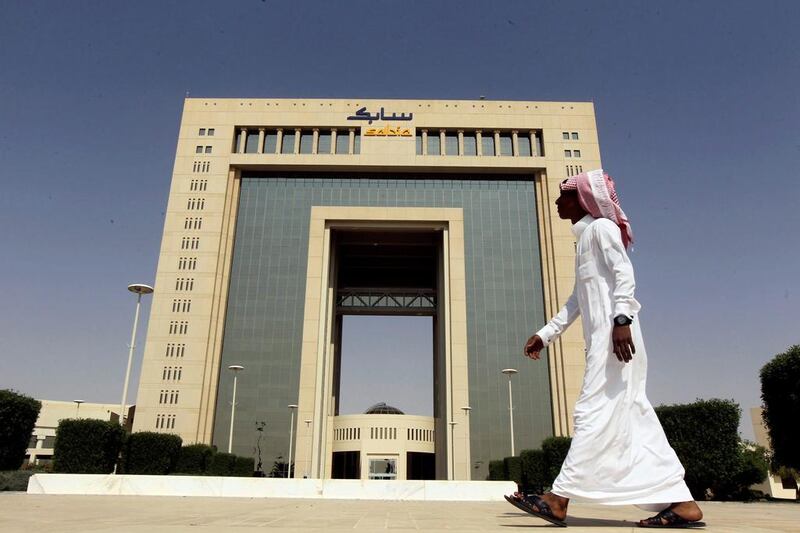Saudi Basic Industries Corporation (Sabic), the biggest petrochemicals producer in the Middle East, recorded a 19 per cent slide in its fourth-quarter net income due to reduced output and fewer products sold.
The company reported a net profit of 3.67 billion Saudi riyals ($979 million) for the three months ending December 31, down from 4.51bn riyals for the same period in 2016, Sabic said in a statement to Saudi Stock Exchange Tadawul, where its shares are traded. Cairo-based investment bank EFG-Hetrmes had estimated Sabic's fourth quarter profit at 5.16bn riyals while NCB capital's forecast was 5.41bn riyals.
Profit for the latest quarter came in about 37 per cent lower than 5.79bn riyal reported at the end of the third quarter of 2017.
Sabic cited "planned turnarounds at certain plants", which impacted output and lower quantities of products sold, as main reasons for the reduced profitability. It also recorded impairments against assets of Hadeed, a wholly owned subsidiary, amounting to 350 million riyals and Ibn Sina amounting to 274m riyals.The fourth quarter sales came in at 40.56bn riyals, up from 37.48bn in the same period in 2016, it said adding that its 2017 full-year net income rose 4.5 per cent to 18.4bn riyals from 17.61bn riyals from a year earlier.
"The increase in net income is attributable to higher average selling price and lower general and administrative expenses," it said in the statement.
Sabic, which is 70 per cent owned by the Saudi government, is among the largest listed firms in the Middle East. The company has restructured its business in recent years as it struggled to maintain profitability amid slower global economic conditions and sluggish demand for its products. Sabic manufacturers plastics, fertilisers and metals that are used in construction, agriculture, industry and the manufacturing of consumer goods.
The company which is looking develop its speciality chemicals business to diversify revenue streams, plans to spend between $3 billion and $10bn on acquisitions over the next five years in specialties and agri-nutrients businesses.
_____________
Read more:
[ Sabic snaps up stake in Swiss speciality chemicals firm ]
[ Saudi Aramco and Sabic to build world's largest oil-to-chemicals plant ]
[ Gulf petchem operators to look overseas for projects and acquisitions ]
_____________
Last week Sabic agreed to buy a 25 per cent stake in Clariant, becoming the largest shareholder of the Swiss chemicals company. Sabic is acquiring approximately 83 million shares in Clariant from 40 North and Corvex Management. Reuters estimates the transaction value at $2.4bn based on Clariant’s market capitalisation.
The latest acquisition amount does not exceed 10 per cent of Sabic’s net assets and the deal will be financed through foreign banks, the company said.
The chemicals industry is a key component of regional economies and contributed $43.8bn to the GCC in 2016 alone, according to a November report from the Gulf Petrochemicals and Chemicals Association. Capacity additions from Saudi Arabia, Opec's biggest oil producer, have been the main driver for the regional petrochems sector.
Sabic, along with Saudi Aramco feature prominently in the kingdom’s economic diversification plans as it seeks greater downstream integration and builds major refining and petrochemicals facilities.
In November Sabic signed an agreement with Aramco to build one of the world’s largest oil-to-chemicals facilities, valued at $20bn, as Riyadh continues to cut its dependence crude revenues. The integrated complex, to be located on the country’s western Red Sea coast, will process around 400,000 barrels per day of oil that would be turned into around 9 million tonnes of chemicals and base oils annually. The facility is set to begin operations in 2025.







